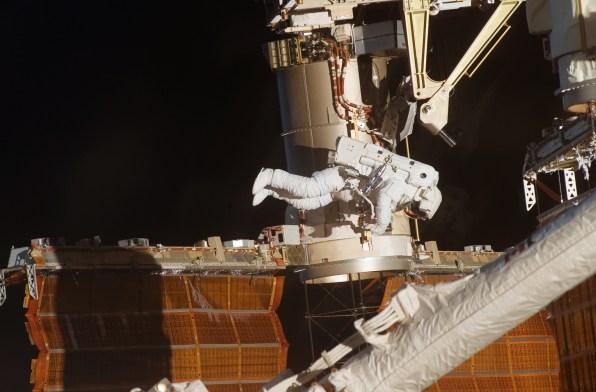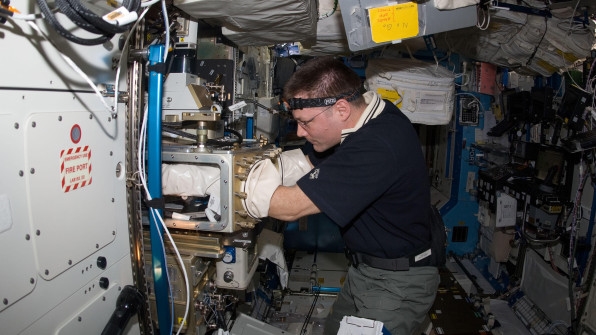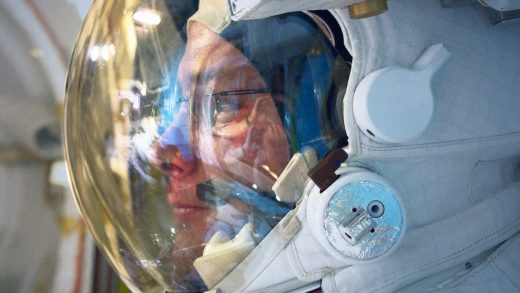Ready for post-vaccine life? This astronaut explains how to reenter society after a long time away
Not many of us can relate to spending multiple months in outer space. But most of the world in the past year can relate to some of the same feelings of loneliness and isolation away from loved ones, and disconnectedness from real life, that astronauts have felt on months-long expeditions. “Those two emotional gut punches are exactly what astronauts experience,” Wheelock says. “There’s a perfect parallel to what we’re experiencing during this lockdown.”
Wheelock, also an engineer and former army colonel, spent more than five months, from June 15 to November 25, 2010, on NASA Expeditions 24 and 25, the latter of which he led as commander. Six people (three Russians and three Americans, including Scott Kelly, brother of Senator Mark Kelly) isolated together, like a pandemic pod but on the International Space Station, which he says is roughly the size of a four-bedroom house (though, unlike us in our lockdown homes, they can float about and use the ceilings and walls too). Like our homebound year, his space sojourn contained fluctuating periods of boredom and unpredictability; the crew endured “dire emergency and uncertainty” for 16 days due to a shutdown of half the station’s cooling system, leading to three unplanned spacewalks to fix it.
But, even after the surreal cosmic lockdown, returning to life on Earth turned out to be equally taxing. Before he went to space, Wheelock understood this in theory because NASA offers training specifically on the tough transition back home. Now it’s a key part of his life: Wheelock helps train new astronauts about adapting to and from space life, based on his former training and learned experiences. That knowledge is even more relevant now, given that we’re all in for a possible shock to the system as we resume normal life. There’ll be a mix of excitement and nerves as most of us get back to our routines, workplaces, and socializing, and Wheelock shares his tips on how to put our lives back on track while mitigating the shock and awkwardness. And he hopes that the emergence acts as a refresh on how we view the world.

“Self-Inventory”
Like many of us in quarantine, Wheelock, who describes himself as a social free spirit, would wait intently for his weekly video chats with his wife, daughter, and friends while in space. “We made it like a party every week,” he says. Still, he was nervous going from the “harsh emotional environment” to normal life on Earth. While it’s easy to recoil at the thought, we should begin now to make the transition smoother. “There’s no way you can thrive by not taking positive steps to get out of that rocking in the corner,” he says.
In late November, after 163 days in space, Wheelock and his crewmates charged down to Earth in a Soyuz capsule—a “little flaming chariot”—and landed in the cold Kazakh Steppe. The first 24 hours back to Earth were relatively fast-paced: They had medical checks, and a welcome-back-to-Earth party with locals, before being whisked back to Houston HQ to reunite with their immediate families. But, following that, Wheelock paced his transition back to Earth life, aware that jumping too fast into activities and catch-ups he’d craved could prove overwhelming. “All those things are racing through your mind, so you have to compartmentalize things and take little baby steps,” he says. As we’re accelerating back to the promise of real life, it’ll be tempting to jump back into life as it was before. “Having a blowout party or a pub crawl the first night might not be the best way to reconnect,” he says.
The pieces of our lives are still there, Wheelock says, but they’re like a smashed 1,000-piece jigsaw puzzle that’s “been dumped out in front of us, and then someone took the box away.” It’s now up to us to take action to put the pieces together again. We should take inventory of what we have—those pieces in front of us. If astronauts panic, or dwell on what they’ve lost, “In space, that will cost you everything,” he says. “Space is the ultimate destination that is completely and totally unforgiving of complacency.” Once we turn over the smashed puzzle pieces, we’ll see the vibrance of the colors, and what’s possible. For each of us, “the things that we have around us are the things that are going to help us emerge from this pandemic.”
Wheelock refers to this process of carefully studying ourselves as self-inventory. He says it’s important to take care of our four pillars of health: the physical, mental, emotional and spiritual, the four foundational corners of the puzzle. “We cannot move forward without discovering something we can do every day to build strength in those four areas,” he says. These could be small things such as making beds, getting out of pajamas and into work clothes, and learning new skills, to get back into a sense of routine. Then, we can start building the rest of the puzzle, the “connective tissues” such as family and friends, that make our lives whole. “That analogy really rescued me several times when I was in space.”

“Recalibration”
As the Soyuz hatch opened on landing in Kazakhstan, the first thing Wheelock remembers thinking was “Oh my, the sweet aroma of Earth!” He says he felt “intoxicated” by the simple sensations of life, such as the sound of birds singing, the feeling of rain, and “the smell of someone cooking a wonderful meal.” He hadn’t seen any of what he calls this “sensory overload” coming. The experience made him appreciate life more, and recalibrate what’s important.
We are not, of course, readjusting to gravity, or experiencing the sensations of outdoors, where many of us have spent a lot of time avoiding the threat of indoor viral spread. But attention to the simple joys of life could apply to other things we’ve missed during quarantine, such as social interactions with people. Once we do reconnect, Wheelock thinks the convergence of our sensory overloads and joys of reconnecting, as well as the emotional heaviness of the pandemic, might draw us toward deeper conversations and really listening to others. This “recalibration” of how we approach life and our fellow humans could move us to be compassionate to those who’ve experienced significant loss and hardships in the past year. “I am so interested now in people’s individual stories,” he says. One actionable task might be deliberately reconnecting with a long-lost friend or family member.
The combination of taking stock of ourselves and refreshing ourselves with a new perspective may help us in the long run—when the puzzle pieces are in place and we’re back on our paths. “When it’s all over, your life will be richer,” Wheelock says. “You’ll be enriched by the experience.”
(62)



